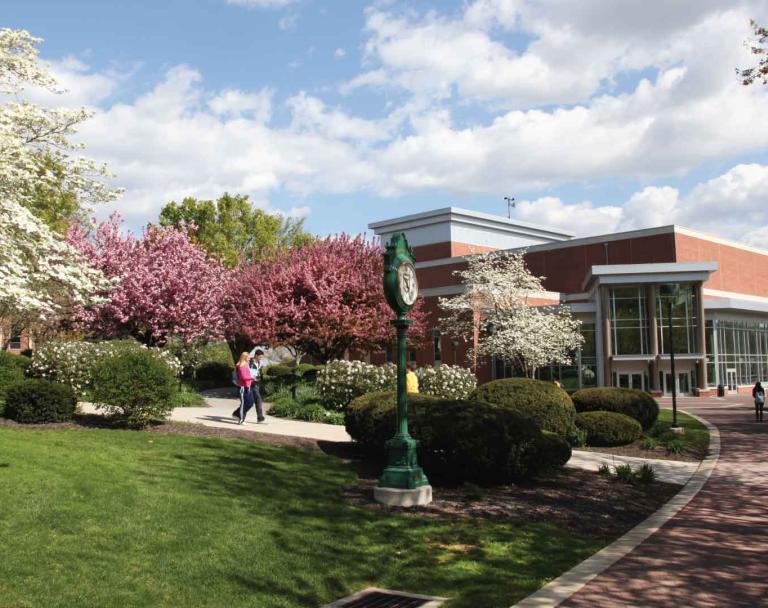Urban Revitalization

- Academics
- Kinsley School of Engineering, Sciences and Technology
- Spotlights
- Urban Revitalization
York College Students Explore Traditional Vs. Equitable Approaches to Revitalization
Communities have long questioned how to improve a city neighborhood without leaving its predominantly Black, brown, and Latinx residents behind. One class of students at York College of Pennsylvania wanted to see if they could contribute to the conversation.
Ryan Lamparter ’21 and Abigail “Abby” Foxwell ’21 both grew up in York County. They saw the work being done in York City, watching various neighborhoods change under efforts to bring new life and a surge of commerce to areas that were struggling.
While new storefronts and apartments and weekend events looked good to most, there was a lingering question: What happened to the people who were here before?
At York College of Pennsylvania, Lamparter and Foxwell were students in the Economics of Urban Revitalization course, taught this year by Silas Chamberlin, Vice President of Economic and Community Development at the York County Economic Alliance (YCEA).
“We wanted to talk about how you make revitalization happen in areas where it’s difficult to do,” Chamberlin says. “It was also important that students understand how revitalization works more traditionally, in larger cities, and then challenge those traditional methods. Sometimes, while it can be seen as successful, the way revitalization happens leads to inequalities in terms of who benefits.”
Meeting key players
Chamberlin wanted the students to meet some of the key players in York City’s revitalization efforts. He invited City Planner Mike Pritchard and private investor Julian Tolbert to the class.
Students also heard from Fred Walker and Anthony Moore, two community members focused on making homeownership a reality for many Black families. Martin Fedorko of White Rose Ventures also spoke about new forms of equity investments that weren’t always accessible for businesses.
“Almost every week we had a new speaker who talked about the success of revitalization, as well as the shortcomings,” Chamberlin says. “It was pretty clear there were opportunities that existed for our community to do better.”
To help determine what doing better looked like, students broke into four different groups, each tackling a topic related to redevelopment. The focus areas were housing, support for businesses, green infrastructure, and access to capital.
Dominic DelliCarpini, Dean of the Center for Community Engagement at York College, also spoke to students about the Urban Collaborative, an initiative that uses project-based research to improve the quality of life in York City. The work is mutually beneficial for students and the community, as data-supported ideas can spark new economic opportunities.
“This work can be applicable to students from a variety of disciplines,” Chamberlin says. “From Engineering students who will one day work for Kinsley or Wagman, to Economics majors who will help run our cities, and Business students who will take deeper dives into economic development.”
A collaborative effort
Lamparter, an Economics major at York College, has always believed that the market will do things as efficiently as possible. It’s up to humans, he says, to create the checks and balances, to ensure that things are equitable and accessible for many. The thing he didn’t consider much before this class was the impact homeownership can have in someone’s life.
Walker and Moore exposed him to that idea. Through their work in helping Black families own a home, Lamparter saw how pride in owning a property means there are fewer blighted communities. He learned how parks can create a sense of togetherness among neighbors. He realized that not everyone understands the concept of financial equity or why they should want to pursue it.
“It’s made me want to have a role in helping to improve York and access to homeownership for everyone,” Lamparter says. “I’ve learned a lot about how that one area can create a world of change.”
Foxwell, a Chemistry major, connected with Sully Pinos, Director of Business Solutions and Innovation at the YCEA. Together, they looked at food deserts and which neighborhoods lack access to healthier food options.
With an interest in green initiatives, Foxwell believes that to take better care of the Earth, we must take better care of people. Her mom is also a social worker, and family conversations have revolved around some of the same topics in the class.
“I looked at a lot of things through the perspective of social health and how it’s better for our community at large if our underrepresented communities are healthy,” she says. “I do think we can make a difference in York. And I don’t think we have to leave anyone behind when we do that.”

